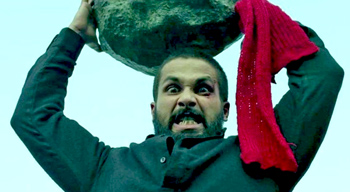Mumbai, Oct 5: See Haider. I wonder if they saw the same film as I did. The Tweeple who made #BoycottHaider trend all Friday on Twitter say the film shows the Indian army in a bad light. On the contrary, the film is a tribute to the masterful way in which the Indian army (and other security forces) suppressed a popular rebellion against India.
 That 1989 rebellion was by people India calls Indians, but the people were trained and backed by a neighbouring state. That is how powerful the rebellion was. Haider shows you how the Indian army saved the Kashmiri territory. As for the Kashmiri people, India had lost them anyway. It is these people, the Kashmiris, that the Indian security forces turned against each other.
That 1989 rebellion was by people India calls Indians, but the people were trained and backed by a neighbouring state. That is how powerful the rebellion was. Haider shows you how the Indian army saved the Kashmiri territory. As for the Kashmiri people, India had lost them anyway. It is these people, the Kashmiris, that the Indian security forces turned against each other.
I once met an Indian army officer in a flight and discussed many things with him. I asked him about the Armed Forces Special Powers Act and the human rights abuses that it protects. He argued that the army’s job was to fight wars on the border or train in the cantonment. If we were to make the army do things that civilian authorities are supposed to do, such as maintain law and order within India’s borders, it would do it its own way. The Indian army, like any army in the world, is trained in only one way: to kill the enemy. If you were to train the Indian army to work within the rules of the Indian Penal Code, do you think it would be able to fight a war on the border?
The army way
The enemy in Kashmir were and are Kashmiris, people we call Indians. If the army is to be deployed to save Srinagar for India from the city’s own residents, it can’t serve arrest warrants. That is why the Armed Forces Special Powers Act is to be used to suspend the Indian Constitution’s guarantee of the right to life. That’s as good as suspending the Constitution.
No popular rebellion in the world has been suppressed without human rights excesses. When two sides have guns, it’s a war. Human rights excesses, or any kind of violence for that matter, are only a symptom of war. The real problem is political. Politicians only worsen the situation by leaving it to the security forces.
Haider is not the first Bollywood film to show army excesses in Kashmir. Rahul Dholakia’s film Lamhaa did so in 2010. If Vishal Bharadwaj really wanted to show the Indian army in a bad light, he could have shown corruption by the army in dealing with militants, as Lamhaa did. A number of books and documentary films have been far more critical of the army’s role. Haider even ends with a note saluting the army’s role in rescuing people in the Kashmir floods.
One suspects the Twitter nationalist’s real problem with Haider is not that it shows the army in a bad light, but that it clearly shows Kashmiris wanting azadi, and being disenchanted with India. That’s a truth we try to hide. Yet, Haider shows this mildly. When a young Shahid Kapoor brings home a gun from school and confesses he wants to go across the border, he is not even allowed to explain why.
It is great to see the Twitter hyper-nationalists call for a boycott rather than a ban. In not wanting the film to be seen, our hyper-nationalists seem to be on the same page as the government of Pakistan, which has not allowed the film to be screened in Pakistani cinema halls.
In the late 2000s, we had a new Kashmir uprising with stones as much as books, films and social media. Kashmiris wanted to make a point. They wanted to tell the world about the excesses of Indian security forces in the ‘90s. They wanted to speak and be heard, something that was denied to them in that decade. They wanted to say they were not a defeated people just because New Delhi had more guns and soldiers.
Appropriating the narrative
That silence was broken and caused some discomfort, but today Bollywood is happy to appropriate it and render it toothless as a means of rebellion. You’re complaining about human rights excesses? Sure, let’s make a sexy Bollywood thriller about it. It will end with a Kashmiri mother telling her son that the real azadi will come when we give up the easy desire for revenge. That the otherwise-difficult censor board clears films like Haider and Lamhaa showing army excesses tells you how much the Indian state is affected by that narrative. Kashmiris lost the rebellion when they took to guns, when they took to stones, and now the narrative war has been masterfully dealt with too.
Haider has its moments but in the end it is a sloppily made, forgettable Bollywood film with action, comedy, suspense, sex, romance and everything thrown in like a roll call. There’s even some dancing around the trees. The filmmakers seemed to have put it out much in advance that it would be controversial, and the Twitter hyper-nationalists seem to be falling in their publicity trap.
Haider ends like most Bollywood action films do: (almost) everybody dies. That’s what the Kashmir conflict is like. That is also what life is like.





Comments
Add new comment